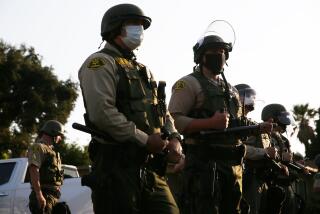New Deputies Set Own Agendas : Young Soviet Lawmakers Standing Up to Old Guard
- Share via
MOSCOW — When Deputy Leonid F. Valentinov’s father telephoned him from their home in Cheboksary, a Volga River city east of Moscow, he had a piece of advice: “Keep your head on your shoulders, and don’t get caught up in the bickering.”
Valentinov, at 24 one of the youngest of the freely elected “messengers of the people,” took his father’s words to heart. Nevertheless, he admits to a certain brashness of youth, and this was reinforced when he was chosen by fellow deputies for the select lawmaking body, the Supreme Soviet.
So, when the leader of his region’s delegation told him to watch President Mikhail S. Gorbachev carefully and toe the Gorbachev line, Valentinov defied the suggestion and joined the minority this week in opposing the Communist Party leader’s choice for vice president.
“We won’t--we can’t--let them pressure us,” Valentinov said, surely unaware that he sounded hauntingly like Jimmy Stewart’s Mr. Smith, who went to Washington and confronted the Establishment in a 1939 movie. “I feel myself on the edge of a historic moment, and I can never forget the responsibility.”
While nationwide attention has focused on a group of well-known progressives from Moscow in the 2,250-member Congress of People’s Deputies--among them Boris N. Yeltsin and Andrei D. Sakharov--a number of unknown, mostly young deputies have come from the hinterlands with reform and history-making on their minds.
A good portion of these energetic, if inexperienced, deputies have found a place on the 542-member Supreme Soviet, where they are likely to influence policy while receiving on-the-job training in political leadership.
Many are breaking into the limelight during this precedent-setting congress, at least for a moment or two. They are taking their turns at the microphone in the Kremlin’s Palace of Congresses, making carefully rehearsed, impassioned speeches about local problems.
The deputies hope for change, of course, but perhaps just as much for a chance to impress the folks back home who elected them--and who can see them live on national television and hear them on radio. Playing to one’s constituents has become a necessity in the Soviet Union.
Valentinov, a clean-shaven, serious man in coat and tie who says he was a construction worker before he became a politician, is innocent and eager in a way he will probably never be again. Describing his feelings to a reporter while eating an ice cream cone, he struggled haltingly for the right words.
Encounter With Gorbachev
“That first day, when the congress opened, Gorbachev approached a group of us deputies and I was close enough to touch him and--it’s hard to explain, but I guess I felt a sort of pride.”
His two fellow deputies from Cheboksary--possibly feeling, at ages 28 and 31, slightly wiser--laughed in a friendly way at Valentinov, and he quickly added, glancing at them, “But that was only the first day.”
Valentinov says his political program is to seek improvements in housing, food supplies and the environment. But it is not in these broad areas that he is likely to make a real impact.
His value is that he and others like him will bring a breath of fresh air to the new Supreme Soviet, which will meet eight months a year to vote on everything from curbing the power of the security police to investigating key decisions of top government ministers.
Valentinov feels himself allied with the other young deputies and has become acquainted with many of them at this congress. They spend long hours after the sessions, turning their hotel rooms into open dormitories and arguing into the night like college freshmen, fired up by the changes that are rapidly transforming their country.
One of Valentinov’s colleagues from Cheboksary, 28-year-old Yuri B. Setkin, said he defeated two Communist Party bureaucrats to win his seat.
“Both were on the wrong side of 50,” he said with a smile. “One of them had a daughter my age.”
Setkin, a veteran of the Soviet Union’s unpopular war in Afghanistan, acknowledged that he had campaigned primarily on the platform of not being a party bureaucrat. But he does have a program. Because Cheboksary is a city that has been troubled by gang wars, he wants to see more organized activities for teen-agers after school.
“Somehow, I am going to take the floor and speak on that issue before I go home,” he said.
Setkin said the topic is important to him because he worries about the future of his twin sons, 6, who, like the rest of the nation, are caught up in the televised meetings of the deputies.
“It’s as good as anything on Soviet television,” Setkin said. “The children are watching all the time, trying to see me. But there are so many of us in the hall, and unless we take the microphone, we look so small. When I telephone them, they cry: ‘Where are you, Father? We cannot find you.’ ”
Nikolai V. Fyodorov, 31, the third deputy from Cheboksary and--by dint of his age--the delegation’s nominal leader--was also named to the Supreme Soviet. He says he hopes to try to amend the constitution so as to provide clearly for the prosecution of top party leaders if they have violated the law.
“If we want, as Gorbachev says, to build a lawful state, this is the first thing we should do,” Fyodorov said. “The country has clearly signaled that it is tired of party bureaucrats, tired of corrupt officials being protected.”
His two colleagues nodded agreement. Yes, said Valentinov, he will try to keep a clear head, as his father advised. But, as for the bickering, well, the three young deputies said they fear it may be difficult to avoid the political skirmishes ahead.
More to Read
Sign up for Essential California
The most important California stories and recommendations in your inbox every morning.
You may occasionally receive promotional content from the Los Angeles Times.










